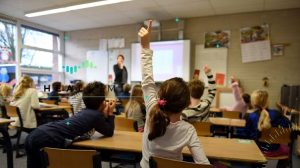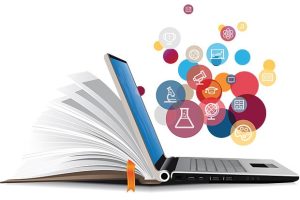In the ever-evolving landscape of education, technology has emerged as a transformative force, shaping the way we learn, teach, and interact. UK boarding schools, renowned for their rich traditions and academic excellence, are embracing this technological revolution, integrating innovative tools and platforms into their time-honored educational practices. This delicate balance between tradition and innovation is at the heart of modern boarding school education, fostering a dynamic learning environment that prepares students for the demands of the 21st century.
Understanding the Evolution of Technology in Education
The integration of technology into education has witnessed a remarkable trajectory, from the introduction of early computers and multimedia presentations to the advent of cloud-based learning platforms and immersive virtual reality experiences. This technological revolution has permeated every aspect of education, transforming classrooms, libraries, and even dorm rooms into hubs of digital learning.
Importance of Technological Integration in Boarding Schools
Boarding schools, with their unique residential environment and holistic approach to education, are well-positioned to leverage technology to enhance student learning and personal growth. By thoughtfully integrating technology into their curriculum, co-curricular activities, and daily operations, boarding schools can:
- Personalize Learning: Tailor educational experiences to individual needs and learning styles, enabling students to progress at their own pace.
- Enhance Collaboration: Foster active engagement and collaboration among students, promoting teamwork, communication, and problem-solving skills.
- Enrich Global Connections: Bridge geographical divides and facilitate cross-cultural interactions, broadening students’ perspectives and preparing them for a globalized world.
- Promote Digital Literacy: Nurture digital fluency and equip students with the skills necessary to navigate the ever-changing digital landscape.
Traditional Foundations: UK Boarding School Culture
UK boarding schools, steeped in centuries of tradition, have long been recognized for their rigorous academic programs, strong pastoral care, and emphasis on character development. These institutions have cultivated a unique culture that has shaped countless generations of students, instilling values, fostering camaraderie, and preparing them for success in life.
Exploring Historical Boarding School Traditions
Boarding school traditions encompass a wide range of practices, from formal rituals and ceremonies to informal customs and shared experiences. These traditions serve to reinforce the school’s ethos, foster a sense of community, and create lasting memories for students.
Balancing Tradition with Technological Advancements
While technology has undoubtedly transformed the educational landscape, UK boarding schools are committed to preserving their rich traditions and the values they embody. The key lies in striking a harmonious balance between tradition and innovation, ensuring that technology complements and enhances the core values and traditions that have made boarding schools so successful.
The Tech Revolution in Education
The impact of technology on learning environments has been profound, transforming the way knowledge is presented, absorbed, and applied. Technology has democratized access to information, enabled personalized learning pathways, and fostered global collaboration.
Adaptation of Technology in UK Boarding Schools
UK boarding schools are embracing the tech revolution, carefully integrating innovative tools and platforms into their educational practices. From interactive whiteboards and digital learning platforms to virtual reality simulations and cloud-based collaboration tools, technology is enhancing the learning experience and preparing students for the demands of the digital age.
Navigating the Integration Process
Integrating technology into boarding school environments requires careful consideration, planning, and implementation. Schools must assess their unique needs, evaluate the suitability of different technologies, and ensure that technology aligns with their educational goals and values.
Challenges Faced in Implementing Tech Innovations
Despite the transformative potential of technology, its integration into boarding schools presents certain challenges. These include:
- Digital Divide: Ensuring equitable access to technology and addressing issues of digital literacy and fluency among students.
- Data Privacy and Cybersecurity: Protecting sensitive student data and implementing robust cybersecurity measures to safeguard against online threats.
- Teacher Training and Support: Providing adequate training and support to educators to effectively integrate technology into their teaching practices.
- Sustainable Tech Practices: Incorporating environmentally friendly and sustainable technology solutions.
Strategies for Embracing Technology While Preserving Tradition
To effectively embrace technology while preserving tradition, UK boarding schools can adopt the following strategies:
- Establish Clear Goals: Clearly define the educational goals and objectives that technology is intended to support.
- Choose Technology Mindfully: Select technologies that align with the school’s ethos, values, and pedagogical approach.
- Provide Comprehensive Training: Offer comprehensive training and support to educators to integrate technology effectively into their teaching practices.
- Engage Parents and Students: Involve parents and students in the decision-making process and encourage their active participation in tech-enhanced education.
- Maintain Open Communication: Foster open communication and collaboration among all stakeholders to address concerns and ensure a smooth transition.
Innovative Tools and Platforms
Exploring the vast spectrum of technology employed in modern boarding schools unveils a range of tools and platforms that redefine educational paradigms. Success stories underline the potential of tech-driven learning enhancement.
Modern boarding schools use an array of technologies to enhance the learning experience for their students. These technologies include:
- Interactive whiteboards with digital learning platforms
- Virtual reality simulations
- Cloud-based collaboration tools
- Learning management systems (LMS)
- Mobile apps for school communication and information
- Video conferencing for virtual field trips and classroom discussions
- Online language learning platforms
- Interactive coding and robotics programs
- Digital portfolios for student progress tracking
Tech-Infused Learning Environments
The transformative benefits of technology in shaping student experiences and cultivating essential skills like digital literacy become apparent in these tech-infused learning environments.
Challenges and Solutions
Addressing concerns surrounding potential tech dependency and strategies to overcome resistance to integration are key facets in ensuring a balanced approach.
The Role of Educators and Administrators
Educator training and effective leadership are pivotal in driving tech initiatives and navigating the integration process seamlessly.
Parental Involvement and Support
Engaging parents in understanding the educational advancements facilitated by technology and collaborative efforts in nurturing holistic student development become focal points.
Future Trends: Forecasting Tech Evolution in Boarding Schools
Predicting the future trajectory of technological advancements within educational spheres and their anticipated implications paves the way for informed decisions and actions
Here are a few trends to watch in the coming years:
1. Artificial intelligence (AI) and machine learning (ML) will be used to personalize learning. AI and ML can be used to create adaptive learning systems that tailor instruction to the individual needs of each student. This will allow students to progress at their own pace and receive individualized attention from teachers.
2. Augmented reality (AR) and virtual reality (VR) will be used to create immersive learning experiences. AR and VR can be used to transport students to different times and places, and to create interactive simulations that allow students to learn by doing.
3. Wearable technology will be used to track student engagement and progress. Wearable technology can be used to collect data on student heart rate, attention levels, and other factors that can be used to assess engagement and progress. This data can then be used to provide teachers with feedback that can be used to improve instruction.
4. Cloud-based computing will continue to make it easier for schools to share resources and collaborate with each other. Cloud-based computing will allow schools to access a wide range of educational resources, and to collaborate with other schools on projects and initiatives.
5. Data analytics will be used to improve decision-making at the school level. Data analytics can be used to identify trends and patterns in student data, which can then be used to inform decision-making about curriculum, instruction, and resource allocation.
6. Cybersecurity will be an increasingly important issue as schools become more reliant on technology. Schools will need to take steps to protect their data from cyberattacks, and to educate their students about cybersecurity best practices.
7. The use of technology to promote global citizenship and cross-cultural understanding will continue to grow. Schools will use technology to connect students with each other from around the world, and to provide them with opportunities to learn about different cultures.
8. Technology will be used to create more inclusive and equitable learning environments. Schools will use technology to provide students with disabilities with access to the same learning opportunities as their peers, and to create a more inclusive school culture.
9. Technology will be used to support the mental health and well-being of students. Schools will use technology to provide students with access to mental health resources, and to create a more supportive and nurturing school environment.
10. Technology will be used to prepare students for the future of work. Schools will use technology to teach students the skills they need to succeed in the 21st century workforce.
By embracing technology, boarding schools can create innovative and effective learning experiences that will prepare students for the challenges and opportunities of the future.
Conclusion
Harmonizing tradition with innovation isn’t a dichotomy but a synergy. Encouraging sustainable tech transitions in UK boarding schools defines the path forward for holistic and progressive education.





